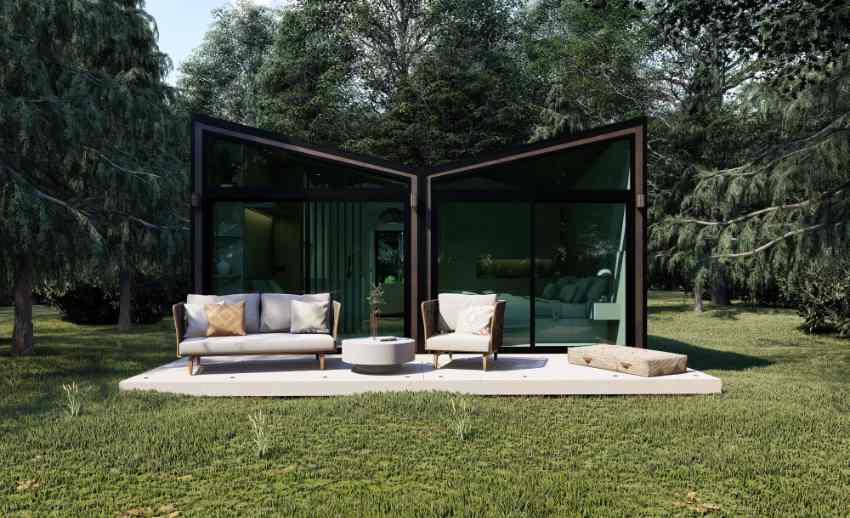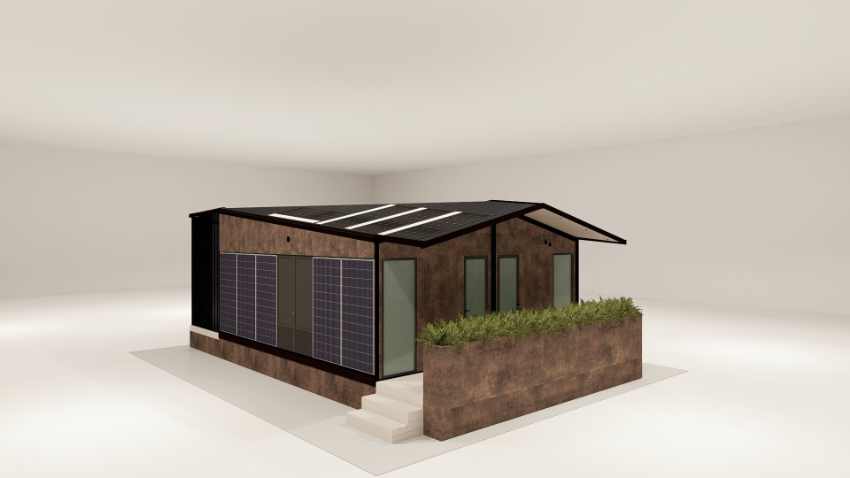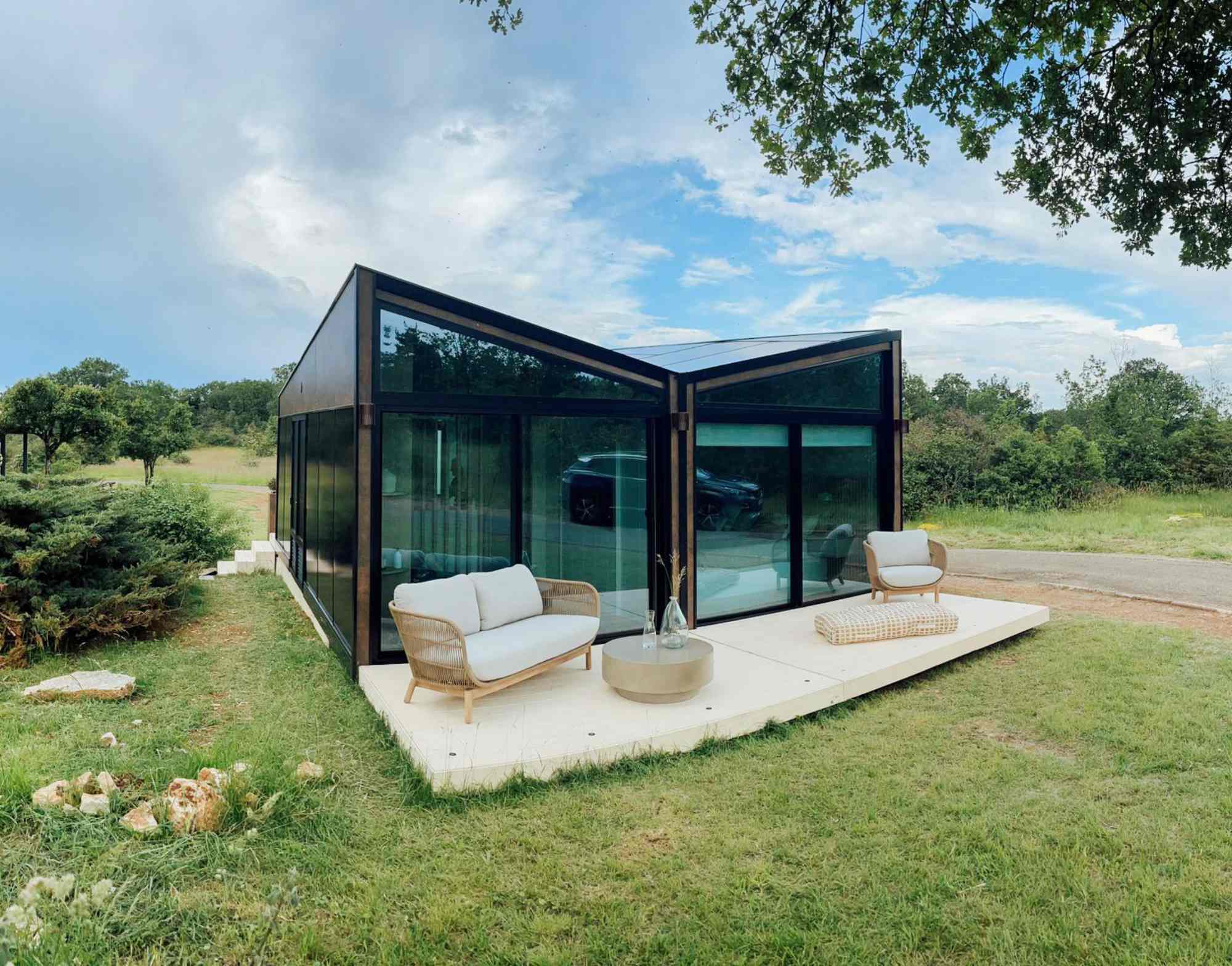Biomespace is a French-Portuguese industrial company that designs and produces Naturetech autonomous housing, integrating technology with a focus on environmental respect and preservation. These homes are characterized by complete autonomy in energy, water, and sanitation: they require no connection to existing networks, making them entirely self-sufficient. Built off-site with an emphasis on efficiency and quality, they embody an eco-responsible and sustainable approach.
Interview with Alain Legout, President of Biomespace France.
What are the main areas of activity of the company?
Alain Legout: Biomespace focuses on the development and production of modular housing. These solutions are based on standard 20 m² modules, designed to adapt to the specific needs of each user. Thanks to their modularity, these homes can be expanded by adding multiple 20 m² modules, enabling customized spaces. Whether for individual residences, collective housing, or tertiary buildings, Biomespace offers a flexible and innovative approach for various applications.
What’s the news about new products/services?
A.L: Biomespace itself is a groundbreaking innovation. It is not just a product but an entirely new concept that redefines the way housing is designed and lived in. The Biomespace module is autonomous, modular, and environmentally friendly. Its foundation system, based on screw piles without concrete slabs, preserves the soil, avoids artificialization, and promotes harmonious integration with the natural environment.
Beyond the technologies, Biomespace embodies a respectful vision of housing: living not crowded next to nature, but in harmony with it. This positioning paves the way for a complete redefinition of urbanization, enabling the design of more dispersed, self-sufficient, and symbiotic urban layouts with their surroundings.
What are the ranges of products/services?
A.L: Biomespace offers a single product line: the Biomespace module. However, thanks to its exceptional modularity, this module can be used to create a wide variety of construction types:
- Individual housing, whether compact or expansive (studios, family homes).
- Collective housing, such as residences for students, seniors, or tourists.
- Tertiary buildings, for example, daycare centers, coworking spaces, or offices.
Each 20 m² module can be combined to form structures of various sizes and shapes, meeting diverse and specific needs.

What is the state of the market where you are currently active?
A.L: The construction sector is facing numerous crises:
- Dependence on concrete, a highly polluting and limited resource (cement, a key component of concrete, is responsible for 7% of global greenhouse gas emissions).
- A global energy crisis, prompting a rethinking of energy needs during construction and use.
- Water scarcity and complex resource management.
- Increasing soil artificialization, severely damaging ecosystems. For instance, in France, around 8% of the land is artificialized, primarily for residential and leisure purposes. A new law aims to reduce new soil artificialization to zero by 2050, requiring a complete rethinking of the construction sector.
- The construction industry’s pollution levels. In France, the building sector accounts for 18% of national greenhouse gas emissions, making it the third-largest emitter after transportation and agriculture.
- Recurring quality issues on traditional construction sites, leading to cost overruns and delays.
Biomespace positions itself as the solution to all these challenges. By offering autonomous modular constructions that preserve the soil and require no network connections or extensive on-site work, the company addresses these issues with an ecological, sustainable, and innovative alternative.
What can you tell us about market trends?
A.L: The construction sector is undergoing a significant transformation, driven by the need to address pressing environmental and societal challenges. One of the key emerging trends is off-site construction, where structures are prefabricated in factories for rapid and efficient on-site assembly. A 2019 McKinsey study predicts that by 2030, 20% of global buildings could be constructed using off-site methods.
Biomespace advances this trend by completely industrializing its process. Its modules are not only manufactured but also fully equipped within the factory, eliminating the need for secondary work on-site. These ready-to-use modules require only assembly upon delivery—a process that can be completed in under two days for an 80 m² house.
This approach exemplifies the future of construction: significantly shortening project timelines, minimizing environmental impact, and ensuring superior quality. It is a forward-thinking trend that is poised to gain widespread adoption in the coming years.
What are the most innovative products/services marketed?
A.L: Biomespace modules embody a revolutionary innovation rooted in their design. Among the standout features is their autonomous toilet system—a groundbreaking solution that miniaturizes waste treatment while eliminating any discharge into the environment. By removing the need for sewer or septic connections, this technology safeguards the soil and ensures complete operational independence.

Yet, it is not just this singular technology that defines Biomespace’s innovative edge; it is the holistic concept that sets it apart. Biomespace creates living environments that function as fully autonomous and harmonious ecosystems. Solar panels and wind turbines generate renewable energy, stored in batteries to power the entire home. An intelligent home automation system optimizes energy use for resident comfort, managing everything from lighting and appliances to a closed-loop water system. Thermal panels heat domestic water and support the sanitary system, while an adiabatic process regulates temperature, delivering modern comfort with exceptional energy efficiency.
By integrating these features, Biomespace provides a positive-energy home equipped with all the technologies needed to meet everyday demands. This concept reimagines living spaces, offering a sustainable, self-sufficient solution perfectly aligned with contemporary lifestyles while preserving and respecting the natural environment.
What estimations do you have for the beginning of 2025?
A.L: Following the establishment of our R&D facility in Mira, Portugal, which enables us to work on small production series, Biomespace is now undergoing significant expansion with the construction of its factory in Idanha-a-Nova. This new site will play a pivotal role in the mass production of Biomespace modules, ensuring stringent quality control and increased capacity to meet growing demand.
Additionally, the company is working closely with partners and engaging in discussions with regulatory authorities to certify all its systems. This certification will facilitate the deployment of Biomespace modules in countries with strict standards, particularly regarding water quality and pollution control. These efforts position Biomespace as a key player in redefining sustainable and innovative housing on an international scale.


